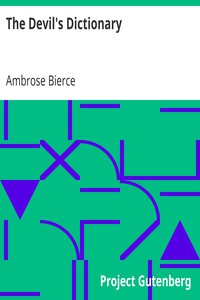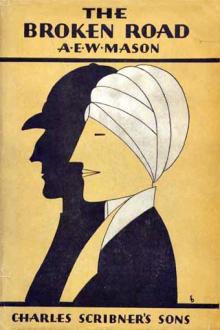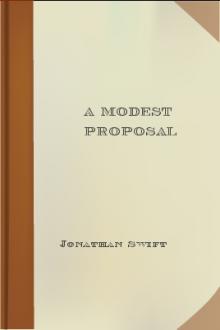The Devil's Dictionary by Ambrose Bierce (good novels to read in english TXT) 📗

- Author: Ambrose Bierce
Book online «The Devil's Dictionary by Ambrose Bierce (good novels to read in english TXT) 📗». Author Ambrose Bierce
"The world is all created," said God, "but you have overlooked something—the mortality of the optimist."
ORATORY, n. A conspiracy between speech and action to cheat the understanding. A tyranny tempered by stenography.
ORPHAN, n. A living person whom death has deprived of the power of filial ingratitude—a privation appealing with a particular eloquence to all that is sympathetic in human nature. When young the orphan is commonly sent to an asylum, where by careful cultivation of its rudimentary sense of locality it is taught to know its place. It is then instructed in the arts of dependence and servitude and eventually turned loose to prey upon the world as a bootblack or scullery maid.
ORTHODOX, n. An ox wearing the popular religious yoke.
ORTHOGRAPHY, n. The science of spelling by the eye instead of the ear. Advocated with more heat than light by the outmates of every asylum for the insane. They have had to concede a few things since the time of Chaucer, but are none the less hot in defence of those to be conceded hereafter.
A spelling reformer indicted For fudge was before the court cicted. The judge said: "Enough— His candle we'll snough, And his sepulchre shall not be whicted."OSTRICH, n. A large bird to which (for its sins, doubtless) nature has denied that hinder toe in which so many pious naturalists have seen a conspicuous evidence of design. The absence of a good working pair of wings is no defect, for, as has been ingeniously pointed out, the ostrich does not fly.
OTHERWISE, adv. No better.
OUTCOME, n. A particular type of disappointment. By the kind of intelligence that sees in an exception a proof of the rule the wisdom of an act is judged by the outcome, the result. This is immortal nonsense; the wisdom of an act is to be juded by the light that the doer had when he performed it.
OUTDO, v.t. To make an enemy.
OUT-OF-DOORS, n. That part of one's environment upon which no government has been able to collect taxes. Chiefly useful to inspire poets.
I climbed to the top of a mountain one day To see the sun setting in glory, And I thought, as I looked at his vanishing ray, Of a perfectly splendid story. 'Twas about an old man and the ass he bestrode Till the strength of the beast was o'ertested; Then the man would carry him miles on the road Till Neddy was pretty well rested. The moon rising solemnly over the crest Of the hills to the east of my station Displayed her broad disk to the darkening west Like a visible new creation. And I thought of a joke (and I laughed till I cried) Of an idle young woman who tarried About a church-door for a look at the bride, Although 'twas herself that was married. To poets all Nature is pregnant with grand Ideas—with thought and emotion. I pity the dunces who don't understand The speech of earth, heaven and ocean.Stromboli Smith
OVATION, n. In ancient Rome, a definite, formal pageant in honor of one who had been disserviceable to the enemies of the nation. A lesser "triumph." In modern English the word is improperly used to signify any loose and spontaneous expression of popular homage to the hero of the hour and place.
"I had an ovation!" the actor man said, But I thought it uncommonly queer, That people and critics by him had been led By the ear. The Latin lexicon makes his absurd Assertion as plain as a peg; In "ovum" we find the true root of the word. It means egg.Dudley Spink
OVEREAT, v. To dine.
Hail, Gastronome, Apostle of Excess, Well skilled to overeat without distress! Thy great invention, the unfatal feast, Shows Man's superiority to Beast.John Boop
OVERWORK, n. A dangerous disorder affecting high public functionaries who want to go fishing.
OWE, v. To have (and to hold) a debt. The word formerly signified not indebtedness, but possession; it meant "own," and in the minds of debtors there is still a good deal of confusion between assets and liabilities.
OYSTER, n. A slimy, gobby shellfish which civilization gives men the hardihood to eat without removing its entrails! The shells are sometimes given to the poor.
PAIN, n. An uncomfortable frame of mind that may have a physical basis in something that is being done to the body, or may be purely mental, caused by the good fortune of another.
PAINTING, n. The art of protecting flat surfaces from the weather and exposing them to the critic.
Formerly, painting and sculpture were combined in the same work: the ancients painted their statues. The only present alliance between the two arts is that the modern painter chisels his patrons.
PALACE, n. A fine and costly residence, particularly that of a great official. The residence of a high dignitary of the Christian Church is called a palace; that of the Founder of his religion was known as a field, or wayside. There is progress.
PALM, n. A species of tree having several varieties, of which the familiar "itching palm" (Palma hominis) is most widely distributed and sedulously cultivated. This noble vegetable exudes a kind of invisible gum, which may be detected by applying to the bark a piece of gold or silver. The metal will adhere with remarkable tenacity. The fruit of the itching palm is so bitter and unsatisfying that a considerable percentage of it is sometimes given away in what are known as "benefactions."
PALMISTRY, n. The 947th method (according to Mimbleshaw's classification) of obtaining money by false pretences. It consists in "reading character" in the wrinkles made by closing the hand. The pretence is not altogether false; character can really be read very accurately in this way, for the wrinkles in every hand submitted plainly spell the word "dupe." The imposture consists in not reading it aloud.
PANDEMONIUM, n. Literally, the Place of All the Demons. Most of them have escaped into politics and finance, and the place is now used as a lecture hall by the Audible Reformer. When disturbed by his voice the ancient echoes clamor appropriate responses most gratifying to his pride of distinction.
PANTALOONS, n. A nether habiliment of the adult civilized male. The garment is tubular and unprovided with hinges at the points of flexion. Supposed to have been invented by a humorist. Called "trousers" by the enlightened and "pants" by the unworthy.
PANTHEISM, n. The doctrine that everything is God, in contradistinction to the doctrine that God is everything.
PANTOMIME, n. A play in which the story is told without violence to the language. The least disagreeable form of dramatic action.
PARDON, v. To remit a penalty and restore to the life of crime. To add to the lure of crime the temptation of ingratitude.
PASSPORT, n. A document treacherously inflicted upon a citizen going abroad, exposing him as an alien and pointing him out for special reprobation and outrage.





Comments (0)